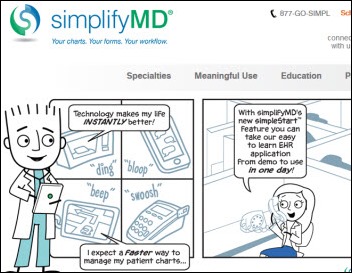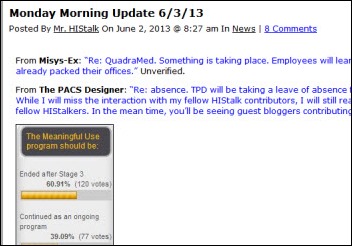Giving a patient medications in the ER, having them pop positive on a test, and then withholding further medications because…
News 6/5/13
Top News
![]() Constellation Software acquires QuadraMed through its subsidiary, N. Harris Computer Corporation. According to Constellation, the purchase of QuadraMed “provides Harris with a platform to support its entry in the US healthcare information technology market.” Financial terms were not disclosed, though Francisco Partners has to be pleased to divest QuadraMed from its portfolio given QuadraMed’s fairly tired product line. FP sold off the company’s most valuable asset, the Quantim HIM product division, to Nuance in September 2012. We ran a reader rumor Sunday (in the Monday Morning Update) that something was going on with QuadraMed courtesy of Misys-Ex, who reported that managers were clearing out their offices and employees would be told how long they had left to work for the company. Meanwhile, President and CEO Duncan W. James leaves QuadraMed to serve as CEO of MModal.
Constellation Software acquires QuadraMed through its subsidiary, N. Harris Computer Corporation. According to Constellation, the purchase of QuadraMed “provides Harris with a platform to support its entry in the US healthcare information technology market.” Financial terms were not disclosed, though Francisco Partners has to be pleased to divest QuadraMed from its portfolio given QuadraMed’s fairly tired product line. FP sold off the company’s most valuable asset, the Quantim HIM product division, to Nuance in September 2012. We ran a reader rumor Sunday (in the Monday Morning Update) that something was going on with QuadraMed courtesy of Misys-Ex, who reported that managers were clearing out their offices and employees would be told how long they had left to work for the company. Meanwhile, President and CEO Duncan W. James leaves QuadraMed to serve as CEO of MModal.
Reader Comments
![]() From Ritchie Valens: “Re:MModal. Shakeup at the top. One Equity Partners is calling the shots now that they are private. They are bringing in their own people since the company has been losing money.” MModal names Duncan W. James, former president and CEO of QuadraMed, as its new CEO, replacing Vern Davenport. The company also promotes David Woodworth from VP of finance to COO, replacing Amy Amick, and names Graham King (McKesson/HBOC) as chairman of the board. The official press release says Davenport and Amick have “chosen” to leave the company.
From Ritchie Valens: “Re:MModal. Shakeup at the top. One Equity Partners is calling the shots now that they are private. They are bringing in their own people since the company has been losing money.” MModal names Duncan W. James, former president and CEO of QuadraMed, as its new CEO, replacing Vern Davenport. The company also promotes David Woodworth from VP of finance to COO, replacing Amy Amick, and names Graham King (McKesson/HBOC) as chairman of the board. The official press release says Davenport and Amick have “chosen” to leave the company.
From GreenJoy: “Re: font. I wonder if you can make the HIStalk font darker? As my eyes age, the font seems to blend into the gray background.” Here’s good way to make it more contrasty and also printable: click the “View/Print Text Only” link at the bottom of the post.
From FDASIA Attendee: “Re: FDASIA. On Friday morning after @farzad_onc gave his rousing inspiring presentation to the workgroup and us attendees, the Chair asked for exemplars of HIT situations from the workgroup. Notably Dr. Paul Tang of Palo Alto Health Foundation spoke of three incidents, the third being most interesting. He reported a death due to a double dosing of potassium ordered by a doctor via CPOE. The point was that the CDS (decision support) failed to warn of the excess.”
From FindingSanity: “Re: CompuGroup. CompuGroup Medical AG removed its last US CEO, Henrik Cruger, in May. The new CEO, Norbert Fischer, has replaced him, but not publicly. This is the sixth CEO change in the five years since the German company opened up US operations. Layoffs and office closures preceded the changeover. Poor sales, poor product performance, and a never-ending trail of unhappy customers has been unfixed with each sudden regime change. Germany continues to struggle not only with the US healthcare market, but with understanding how to run an American company with American customers who all quit believing the company years ago.” Unverified.
Acquisitions, Funding, Business, and Stock

SimplifyMD raises $1.3 million of a planned $1.8 million round of funding.
Patient engagement platform vendor Seamless Medical Systems closes $2 million in early stage funding.
Sales
Baptist Memorial Health Care will implement Omnicell’s G4 Unity medication management solutions across its 14 affiliated hospitals.
MedCentral Health System (OH) selects Wolters Kluwer Health’s ProVation Order Sets.
Boone Memorial Hospital (WV) selects Medhost’s EDIS.
Practice management service provider MyHealthNetwork (GA) will use Valence Health’s population health management and clinical integration solutions to identify customized patient populations.
Twenty-five bed Memorial Medical Center (WI) selects CPSI as its EMR vendor of choice after finding that NextGen, according to the local newspaper, “was not equipped to meet MMC’s needs as a facility.”
Ocean Beach Hospital (WA) chooses Healthland Centriq EHR.
The University of Arizona Health Network selects Capsule’s medical device integration solutions for its ED, OR, and ICU.
The DoD awards Philips Healthcare Informatics an $88.5 million medical imaging contract.
People
Vocera Communications promotes Brent D. Lang from president/COO to president/CEO, replacing Robert Zollars, who will remain as executive chairman of the board.
Rick Gilfillan, MD, head of CMS’s Innovation Center, will leave his post at the end of June.
Jeffrey Ferranti, MD, MS is promoted to CIO/VP of medical informatics at Duke Medicine (NC).
Diane Adams (Allscripts) is named chief people officer of QlikTech.
Announcements and Implementations
Cerner names Abu Dhabi Health Services Company, King Faisal Specialist Hospital & Research Centre (Saudi Arabia), and the UAE Ministry of Health winners of its Cerner Achievement & Innovation Awards 2013, which recognize excellence in adopting HIT in the Middle East.
The SSI Group and ICA will combine EHR and claims data to give payers and clinicians insight into patient populations.
Covenant Medical Group (TX) implements PerfectServe’s secure clinical communication platform.
Australia’s NSW and Queensland Public Hospitals will begin implementing Cerner Millennium late 2013.
Sanford Bemidji (MN) goes live on Epic.
Wolters Kluwer Health releases a Controlled Substances File for its Medi-Span drug database solution to help providers, pharmacies, payers, and EHR vendors adhere to controlled substance prescribing and reporting requirements.
PatientCo will integrate Streamline Health’s business analytics solution into its patient financial engagement platform.
Government and Politics
![]() HHS Secretary Kathleen Sebelius announces the release of hospital outpatient charge data and details about which EHRs are being used by EPs for MU attestation, saying that, “a more data driven and transparent healthcare market can help consumers and their families make important decisions about their care.” If that’s the case, why doesn’t Big Data CMS address possible concerns about privacy and security and then release much, much more data from its vast stores?
HHS Secretary Kathleen Sebelius announces the release of hospital outpatient charge data and details about which EHRs are being used by EPs for MU attestation, saying that, “a more data driven and transparent healthcare market can help consumers and their families make important decisions about their care.” If that’s the case, why doesn’t Big Data CMS address possible concerns about privacy and security and then release much, much more data from its vast stores?
The Robert Wood Johnson Foundation launches a developer competition that will award $120,000 in prizes for creating technology components that turn the recently released CMS hospital pricing data into “intuitive, actionable tools.” Developers who can do this will earn their prize given that the CMS information is close to worthless, even to those few consumers who are willing and able to try to make sense of bizarre hospital Medicare and Medicaid pricing practices (from that same CMS, ironically enough) that probably don’t pertain to them.
Healthcare crowdfunding site Health Tech Hatch runs a Blue Button CoDesign Challenge to accept idea submissions that complete the sentence, “Build me a Blue Button-enabled tool that …” and then letting the community vote (through June 11) for the developers that will be chosen to build Blue Button prototypes for judging in August. Above is National Coordinator Farzad Mostashari describing the contest from Health Datapalooza on Monday.
The White House proposes patent troll legislation that would require companies threatening patent lawsuits to disclose who actually owns the patent, to initiate protection of end users of technology that is the subject of a patent claim, and to review policies and increase education. A commissioned study finds that patent trolls file 62 percent of infringement lawsuits vs. 29 percent just two years ago. The study specifically quoted health IT examples, including (a) the difficulty in separating function vs. means of delivering the function in medical imaging software, and (b) a healthcare technology vendor that had to cease research on a particular technology while being sued by a patent troll, causing its sales to drop by a third.
An NIH-funded study at Partners HealthCare finds that EHR information can complement evidence-based clinical decision support by identifying physician “group intelligence,” with the example being a better way to identify ordering of excessive lab tests by looking at patient subpopulations and concurrent medical situations instead of just lab data alone.
Kaiser Permanente announces the launch of its first application programming interface, which will allow developers to build apps using a database of Kaiser’s hospital and medical office locations. Hopefully their experience will encourage them to eventually open up access to something more useful. Travis has already played with the API and has thoughts on HIStalk Connect.
Other
Palomar Medical Center blames declining reimbursements, state budget cuts, and sequestration for its decision to lay off 84 employees, or about two percent of its workforce, as of July 26. It opened a billion-dollar new hospital in August 2012.
Heritage Provider Network awards $500,000 to POWERDOT.HPN, whose team is leading in a challenge to create an algorithm that predicts how many days a patient will stay in the hospital.
Practice Fusion launches Insight, a real-time analytics service that sells the patient information stored in its free EHR database to drug companies, including “real-time data covering diagnoses, prescribing behaviors, patient demographics and more.”
![]() The Annals of Internal Medicine publishes a report finding that less than 10 percent of physicians have EHRs that meet Meaningful Use criteria, leading the authors to remark that the results “should be of concern to policy makers.” What should be of concern to just about everyone reading the report (including the publisher) is that the findings are based on data collected from late 2011 to early 2012. Perhaps none of the Annals of Internal Medicine editors have noticed recent reports that more than 50 percent of EPs have demonstrated MU, and EHR adoption has grown dramatically in the last 18 months.
The Annals of Internal Medicine publishes a report finding that less than 10 percent of physicians have EHRs that meet Meaningful Use criteria, leading the authors to remark that the results “should be of concern to policy makers.” What should be of concern to just about everyone reading the report (including the publisher) is that the findings are based on data collected from late 2011 to early 2012. Perhaps none of the Annals of Internal Medicine editors have noticed recent reports that more than 50 percent of EPs have demonstrated MU, and EHR adoption has grown dramatically in the last 18 months.
The Pennsylvania Patient Safety Authority finds that using a hybrid mix of paper and electronic records for clinical documentation, either during an EHR transition or as a workaround, causes errors, mostly because of faulty handoff processes.
Boston Children’s Hospital (MA) is piloting MyPassport, an iPad app that helps patients identify their caregivers and understand their care better.
Three doctors in Canada change practices only to find that their former employer refuses to provide the electronic medical records of their patients, offering only the partial information kept on paper. The law requires only that paper records be made available.
Weird News Andy wants to know whether it’s cider or balsamic. A cheap vinegar test, serving as a replacement for unaffordable Pap smears in India, reduced cervical cancer deaths by one-third in a study of 150,000 women living in India’s slums. Minimally trained locals simply swab the cervix with diluted vinegar and check for a color change that indicates the presence of abnormal cells. Despite the benefits, the challenges in India are substantial: most women give birth at home having never visited a physician, the culture doesn’t allow them to make decisions for themselves without the approval of a man, and one health worker was beaten by a local mob when women found they had to take their clothes off for the screening.
Sponsor Updates
- HealthMEDX announces the general availability of a bi-directional pharmacy interface between its Vision product and Omnicare.
- Crain’s Chicago Business names Impact Advisors and Allscripts to its list of the 50 fastest-growing public and private companies in the Chicago area based on five-year revenue growth.
- Craneware showcases its Pharmacy ChargeLink technology at this week’s American Society for Health-System Pharmacists 2013 Summer Meeting and Exposition in Minneapolis.
- Lifepoint Informatics will serve as a gold sponsor at next week’s MDx NEXT conference on molecular diagnostic testing and genomic medicine. Also at the MDx NEXT Conference: Halfpenny Technology will demonstrate its clinical data exchange solution for molecular laboratories.
- Besler Consulting and TeleTracking Technologies are awarded “Peer Reviewed by HFMA” designation.
- John Fangman, MD and Michael Barbouche of Forward Health Group spoke at HealthDatapalooza IV this week in Washington DC, presenting with the Aids Resource Center of Wisconsin on managing high-risk HIV/AIDS populations.
- ZirMed will launch a new brand and demonstrate its RCM, clinical communications, and analytics solutions at the HMFA 2013 Annual Institute conference June 16-18 in Orlando.
- Info-Tech Research Group recognizes CommVault as an industry “champion” in virtual backup software, e-mail archiving, and backup software for heterogeneous environments in its “Vendor Landscape” report.
- The Advisory Board Company launches the National Population Health Symposium September 13 in Washington, DC to give provider thought leaders the opportunity to collaborate on managing risk and migrating to a population health delivery system.
- MediGain and ADP AdvancedMD post a video of their co-hosted Webinar on helping physicians prepare for healthcare reform.
- Billians HealthDATA adds the latest AHRQ data to its online hospital database line-up.
- Alere Analytics launches its clinical surveillance solution for infection control and medication management.
- CareTech Solutions will participate in this month’s Ohio Hospital Association Annual Meeting and the Michigan Association Annual Meeting.
- Ryan Tracy, MD of Diablo Valley Pediatrics and his staff discuss how their use of ADP AdvancedMD EHR eliminated manual process inefficiencies.
- Care Team Connect hosts a July 10 Webinar on preventing readmissions.
- Versus client Western Maryland Health System is featured in a June 20 AHA webinar on staff safety.
- Informatica kicks off its Informatica World 2013 user conference and will make keynote sessions available via live Webcast.
- EMDs highlights its support of the University of Texas Health IT program.
- Hayes Management Consulting expands its clinical and revenue cycle optimization service lines to include increased focus on measuring outcomes and outcome-driven operational improvement services.
- In a June 20 Imprivata-sponsored Webinar, Larry Ponemon reviews the findings of Ponemon Institute’s study entitled, “The Economic & Productivity Impact of IT Security on Healthcare.”
- Beacon Partners hosts a June 7 Webinar with executive consultant Cindy Friend discussing how the PCMH model supports ACOs.
- Nuesoft looks at the need of specialists for customized EHRs.
- The Huntzinger Management Group launches Huntzinger Staffing Solutions, which will HIT implementation resources.
Contacts
Mr. H, Inga, Dr. Jayne, Dr. Gregg, Lt. Dan, Dr. Travis.
More news: HIStalk Practice, HIStalk Connect.





















Re: FDASIA Attendee – Dr. Paul Tang of Palo Alto Health Foundation spoke of three incidents:
The problem is, numerous leaders in the Medical Informatics academic community (of which I am, in fact, a member, though no longer at a place like Yale) opine that reports of health IT-related adverse outcomes are simply “anecdotes.”
The attitude is almost sociopathic.
Examples:
From a Penn VP: “health IT implementation is a quality assurance initiative, so informed consent does not apply” (and by inference, neither do any other ethical codes for patient protection);
From the CIO of the Cleveland Clinic, on an actual airing of NPR’s Diane Rehm show in response to my call-in questions about harms: “We should expect some bumps in the road.” (I.e., the mounds covering patients who died and who were never afforded informed consent);
From OHSU: “you [Silverstein] will keep making the big bucks by preying on juries, who we know from history are not good arbiters of truth [about health IT risks].” (i.e., only esteemed academics are).
Now we have the recent ECRI Deep Dive study that found 170 or so EHR-related errors in 36 hospitals over 9 weeks, voluntarily reported, causing 8 injuries and 3 possible deaths. This is perhaps the first reasonably robust study looking at the issue. However, the risks have been evident to me and my cohort of “health IT iconoclasts” for years now.
It’s nice of Paul Tang to come clean on health IT risks. It’s too bad the admission is coming in 2013, not 2003 … or 1993.
Yet we still have hospital management ignoring their own clinicians on risk, such as at Marin General. Perhaps contributory, the malpractice environment in California largely shields the medical system with caps on damages.
That is a perfect setting for disdain for patients rights and IT experimentation.
Harsh assessment? Think about being a patient in such a hospital, and not being informed that perhaps you should have sought care elsewhere while the “glitches” are worked out. It’s only the nurses putting their careers at risk and speaking publicly that the situation is known.
If anyone reading this board finds that acceptable, you’re simply nuts.
“The Robert Wood Johnson Foundation launches a developer competition that will award $120,000 in prizes for creating technology components that turn the recently released CMS hospital pricing data into “intuitive, actionable tools.”
It would better spend its money on creating EHRs that turn the tables on current impediments to care and enable doctors to provide more efficient, safer, and thoughtful management of their patients.
On sentence building: “complete the sentence, “Build me a Blue Button-enabled tool that …” completed answer: “makes my care safer by enabling the doctors to spend more time speaking to me rather than clicking their EHR mouse”
Finally, The Annals of Internal Medicine report holds true today, even with the 50% penetrance of EHR. If the study was to be done again, the results would be even more sobering and staggering for the lawmakers. Did you read the accompanying editorial written by Dr. Ross Koppel of Penn? Way back when, you had interviewed him.
“Practice Fusion launches Insight, a real-time analytics service that sells the patient information stored in its free EHR database to drug companies, including ‘real-time data covering diagnoses, prescribing behaviors, patient demographics and more.’ ”
Recieve at least three pharma ads based on YOUR personal demographics and diagnosis before you’ve even left the doctor’s office!!